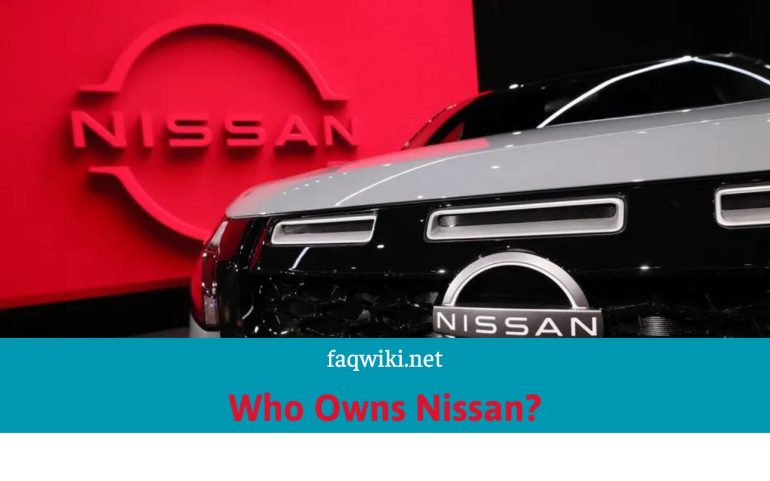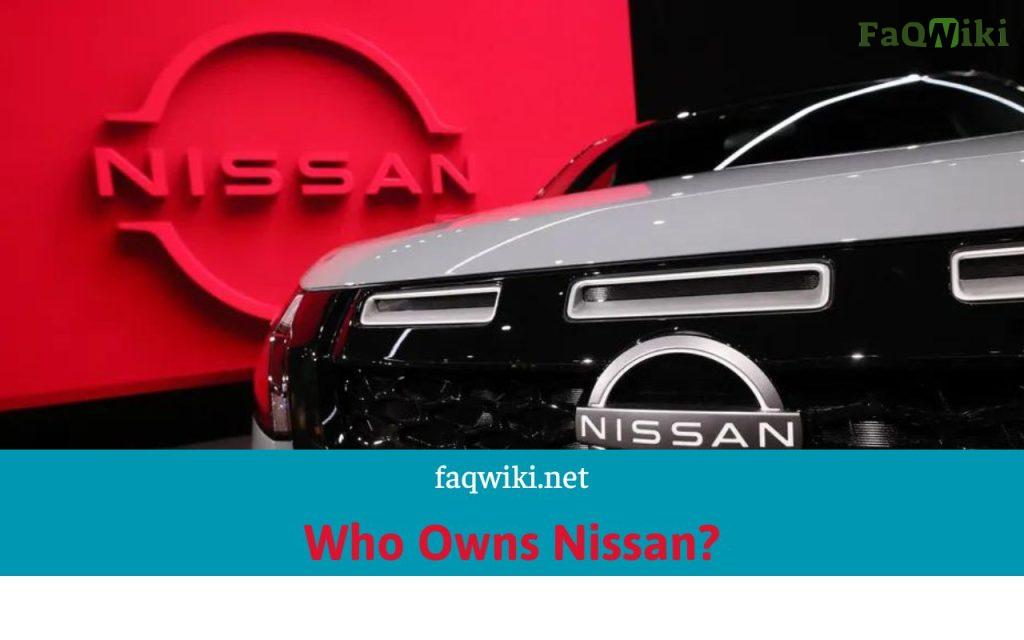Who Owns Nissan: A Comprehensive Look into the Ownership Structure

Introduction
Nissan is a well-known Japanese multinational automobile manufacturer that has been in operation since the 1930s. The company has a rich history and has grown over the years to become one of the largest automotive companies in the world. It is important to understand Nissan’s ownership structure because it provides insight into how the company operates and its relationships with other entities. This article will provide a comprehensive look into Nissan’s ownership structure, including its early years, the Renault and Nissan alliance, Mitsubishi’s involvement, Nissan’s shareholders, the Renault-Nissan-Mitsubishi Alliance ownership structure, the Carlos Ghosn scandal, current state of Nissan’s ownership, and Nissan’s management and corporate governance.

Nissan’s Early Years
Nissan was founded in 1933 as the Jidosha Seizo Co. Ltd. in Tokyo, Japan. The company was established with the goal of producing high-quality automobiles that could compete with the best in the world. The company was renamed Nissan Motor Co. Ltd. in 1934, and it continued to grow over the years. During World War II, Nissan produced trucks and aircraft engines for the Japanese military.
After the war, Nissan resumed automobile production, and it became a major player in the global automotive market. In the 1960s, Nissan expanded into the American market and became the first Japanese car company to establish a production facility in the United States. By the 1980s, Nissan was one of the largest automotive companies in the world, and it continued to expand its operations.
Renault and Nissan Alliance
In 1999, Renault, the French automobile manufacturer, acquired a 36.8% stake in Nissan. This acquisition was the beginning of the Renault and Nissan Alliance, which is one of the most successful strategic partnerships in the automotive industry. The alliance was formed to leverage each other’s strengths and capabilities to achieve greater efficiency, competitiveness, and profitability.
Renault’s investment in Nissan provided the Japanese automaker with much-needed capital and technology, while Renault gained access to Nissan’s expertise in small cars and the Asian market. The alliance also allowed both companies to share development costs and benefit from economies of scale.
One of the key benefits of the Renault and Nissan alliance was the sharing of platforms and components between the two companies. This allowed both companies to reduce development costs and accelerate the time to market for new models. The alliance also allowed the companies to share purchasing and logistics functions, which further reduced costs.
However, the alliance was not without its challenges. One of the most significant challenges was the cultural differences between the two companies. Renault is a French company, while Nissan is a Japanese company, and the two have different approaches to business and management. Additionally, the alliance faced challenges due to the global financial crisis, which resulted in a decline in sales for both companies.
Mitsubishi’s Involvement
In 2016, Nissan acquired a 34% stake in Mitsubishi Motors, another Japanese automaker. This acquisition was part of Nissan’s strategy to strengthen its position in the global automotive market and expand its product portfolio. The partnership between Nissan and Mitsubishi allowed both companies to share technology and components, which helped reduce costs and accelerate the time to market for new models.
The partnership between Nissan and Mitsubishi was not without its challenges. In 2016, Mitsubishi was embroiled in a financial scandal involving the manipulation of fuel economy data. This scandal had a significant impact on Mitsubishi’s reputation and sales, and it also affected Nissan, which was forced to recall and retest some of its vehicles that used Mitsubishi’s engines.
Despite these challenges, the partnership between Nissan and Mitsubishi has been beneficial for both companies. The two companies have been able to leverage each other’s strengths to develop new products and technologies, and to expand into new markets.
Nissan’s Shareholders
Nissan’s ownership is spread across a wide range of shareholders, including institutional investors, individual investors, and the Renault-Nissan-Mitsubishi Alliance. As of 2021, the largest shareholder in Nissan is Renault, which owns a 43.4% stake in the company. The Japanese government is also a significant shareholder, with a 15% stake. Other major shareholders include institutional investors such as The Vanguard Group, Inc. and BlackRock, Inc.
The ownership structure of Nissan has been a subject of debate and controversy over the years. Some critics argue that the company is too heavily influenced by Renault, while others argue that the Japanese government should play a more significant role in the company’s management. Despite these criticisms, Nissan has continued to operate as an independent company, with its own management team and corporate governance structure.
Renault-Nissan-Mitsubishi Alliance Ownership Structure
The Renault-Nissan-Mitsubishi Alliance is one of the most successful strategic partnerships in the automotive industry. The alliance was established in 1999, and it has since grown to become one of the largest automotive groups in the world. The alliance is structured as a complex web of cross-shareholdings and joint ventures between the three companies.
The alliance is structured so that each company has an equal say in the management of the group. The CEO of the alliance is appointed by the board of directors, which is made up of representatives from each of the three companies. The alliance operates as a federation of three independent companies, with each company retaining its own identity and brand.
The Renault-Nissan-Mitsubishi Alliance has been successful in achieving its goals of greater efficiency, competitiveness, and profitability. The alliance has allowed the companies to share technology, platforms, and components, which has helped reduce costs and accelerate the time to market for new models. The alliance has also allowed the companies to benefit from economies of scale in areas such as purchasing and logistics.
The Carlos Ghosn Scandal
One of the most significant events in Nissan’s recent history was the arrest of Carlos Ghosn, the former CEO of Nissan, in 2018. Ghosn was arrested in Japan on charges of financial misconduct, including underreporting his compensation and using company funds for personal expenses. Ghosn denied the charges and fled Japan while on bail, and he is currently living in Lebanon.
The Ghosn scandal had a significant impact on Nissan’s reputation and operations. The scandal exposed deep divisions within the company’s management and board of directors, and it also highlighted the challenges faced by the Renault-Nissan-Mitsubishi Alliance. The scandal led to a period of turmoil for Nissan, with the company struggling to regain its footing and restore its reputation.
Current State of Nissan’s Ownership
As of 2021, Nissan’s ownership structure remains largely unchanged from previous years. Renault is still the largest shareholder, with a 43.4% stake in the company, while the Japanese government holds a 15% stake. Other major shareholders include institutional investors such as The Vanguard Group, Inc. and BlackRock, Inc.
Nissan’s management team has also undergone significant changes in recent years. In 2019, Nissan appointed Makoto Uchida as its new CEO, replacing Hiroto Saikawa, who resigned amid a financial scandal. Uchida has been tasked with leading Nissan through a period of transformation, as the company seeks to reinvent itself and regain its position in the global automotive market.
Nissan’s Management and Corporate Governance
Nissan’s management and corporate governance structure has been the subject of scrutiny and criticism over the years. The company has faced accusations of weak corporate governance and a lack of transparency, particularly in the aftermath of the Ghosn scandal. However, Nissan has taken steps to improve its governance practices in recent years, including the appointment of new board members and the establishment of an independent committee to oversee the company’s governance.
In terms of management, Nissan operates with a CEO and a board of directors. The board of directors is responsible for overseeing the company’s strategy and operations, while the CEO is responsible for implementing that strategy and leading the company on a day-to-day basis. The company also has a number of committees and councils, including a Nomination Committee, a Compensation Committee, and a Corporate Governance Committee.
Nissan has also taken steps to improve its corporate social responsibility (CSR) practices. The company has established a CSR Committee, which is responsible for overseeing the company’s social and environmental initiatives. Nissan has set ambitious targets for reducing its environmental impact, including a goal of achieving carbon neutrality by 2050.
Nissan’s Future Ownership and Strategy
Looking ahead, Nissan faces a number of challenges and opportunities as it seeks to reinvent itself and regain its position in the global automotive market. The company has set out a new strategy, known as Nissan Next, which aims to improve profitability, strengthen the company’s brand, and accelerate the development of new technologies.
As part of this strategy, Nissan is planning to launch a range of new electric vehicles (EVs) and hybrid vehicles in the coming years. The company has also announced plans to launch a new series of vehicles under the brand name Ariya, which will be fully electric and feature advanced autonomous driving technologies.
In terms of ownership, there has been speculation that Renault may seek to increase its stake in Nissan in the future. However, any such move would likely be subject to approval from the Japanese government, which has expressed concerns about the level of influence that Renault holds over Nissan.
Conclusion
In conclusion, Nissan’s ownership is complex and spread across a wide range of shareholders, including Renault, the Japanese government, and institutional investors. The company has faced a number of challenges in recent years, including the Ghosn scandal and declining sales. However, Nissan has taken steps to improve its governance and CSR practices and is implementing a new strategy, Nissan Next, to improve profitability and accelerate the development of new technologies. The future of Nissan remains uncertain, but the company is working to reinvent itself and regain its position in the global automotive market.
FAQs
Who owns Nissan?
Nissan’s ownership is spread across a wide range of shareholders, including Renault, the Japanese government, and institutional investors such as The Vanguard Group and BlackRock.
What is the Renault-Nissan-Mitsubishi Alliance?
The Renault-Nissan-Mitsubishi Alliance is a strategic partnership between three automotive companies: Renault, Nissan, and Mitsubishi. The alliance in 1999 with the goal of increasing efficiency and competitiveness through shared resources and technology.
What was the Ghosn scandal?
The Ghosn scandal refers to the arrest and subsequent legal proceedings against Carlos Ghosn, former Chairman and CEO of Nissan, in 2018. Ghosn was accused of financial misconduct, including underreporting his income and misusing company assets. The scandal led to Ghosn’s resignation and a major shakeup in Nissan’s leadership and governance practices.
What is Nissan Next?
Nissan Next is a new strategy announced by Nissan in 2020. The strategy aims to improve profitability, strengthen the company’s brand, and accelerate the development of new technologies. As part of this strategy, Nissan is planning to launch a range of new electric vehicles and hybrid vehicles in the coming years, as well as a new series of vehicles under the brand name Ariya.
What is Nissan’s stance on corporate social responsibility?
Nissan is committed to corporate social responsibility and has established a CSR Committee to oversee the company’s social and environmental initiatives. The company has set ambitious targets for reducing its environmental impact, including a goal of achieving carbon neutrality by 2050. Nissan is also involved in a range of social and community initiatives, including partnerships with non-profit organizations and disaster relief efforts.
